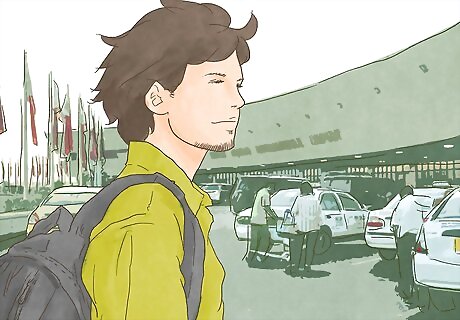
views
Preparing to Study Abroad

Choose the right study abroad program. This is the most important step. You'll have to decide what program is best for you — not what program is best for your twenty closest friends in college. You'll have to pick the program you want to do, and the city where you'll be studying. Here's how to decide: If you're not majoring in a foreign language or interested in one particular foreign culture, do some research. Look through travel guides and search the Internet to see what city appeals to you. Once you've narrowed your list down to a few places, ask around to see if you know anyone who did the program you were thinking of, and ask how it was. If you are already majoring or minoring in a foreign language, it's likely that you'll want to study in a country where that language is spoken. You need to check to see how many credits toward your major or minor you will receive from each program. You can also decide if you want to do a program directly through your school or through another college. There are advantages and disadvantages to both. If you choose a program through your own college, it's likely that your credits will transfer more easily, that you'll be around some people you know and will feel more comfortable, and that you'll have to do a lot less paperwork to get the process approved. If you choose a program outside of your university, you may have more options to choose from and will be more adventurous because you'll be studying with a group of people you've never met, but you'll have to do more work to find and apply to the program.

Once you choose your program, you have to take the required tests and get the scores before application deadline of the program. Then you might have to report the scores to the chosen program departments or schools as instructed in how to apply in their website.

Once you are done with the tests and arranging documents for applying, fill out your application and submit. You'll have to ask about the student visa requirements and make sure to have a current passport. Each country is different, so figure this out well in advance.

Once you get your admission decision, ask them for the official admission document like i20. Different countries have different documents, with which you can apply for a visa, then apply for a student visa.

Begin to immerse yourself in the local culture. You can start preparing for your study abroad trip months in advance. Not only will this make you more prepared to embark on your foreign journey, but it will also make you more pumped to begin your adventure. Here's what you can do: Brush up your language skills. If you need to know a foreign language in your country of choice, take a language class and practice speaking it on your own. Watch movies in the language to help your comprehension skills. Take a class about the culture. If your school offers a course about the history or art of the culture, you should jump at the opportunity. Try some cuisine from the culture. If you're in the right place, it won't be too hard to try some local fare from thousands miles away. Give it a try to get used to the thought of eating it every day. Hang out with friends who are also studying in the same country or city. You can start immersing yourselves in the country together.

Prepare for your destination city. Once you know where you'll be living, read everything you can about the city. Read blogs online, get travel books, and read up on the history of the city. This will give you a stronger appreciation of where you're going, and of all the cool stuff you'll have to do once you get there. Create a bucket list. Make a list of at least twenty things you just have to do in the city before you leave. Mark all the pages in your travel books that show places that you just have to see. Talk to other people who have lived in or studied in the city before. Write down their recommendations. Read up on the weather in your destination city. This will help you know what clothes to pack.
Making the Most of Your Study Abroad Experience

Immerse yourself in the local culture. Above all else, this should be the final goal of your study abroad experience. You have chosen to study in a foreign country because you are excited about its culture and customs, and because you want to broaden your perspective on the world. Therefore, you should seize every opportunity you have to try something new, have a new experience, and to step out of your comfort zone. Here's what you should do: If you're in a country where a foreign language is spoken, immerse yourself in it. Try to speak the language as much as possible, to read the language, and to even catch TV shows on the local channels. Enjoy the cuisine of a foreign land. Though you'll crave your old favorite foods and should indulge once in a while, try to eat as much local food as possible. Understand the local customs. If you're in a country where a siesta is customary, then take one. Enjoy the local music and dance culture. Go to a show or a concert. Watch local films. Go to the movies in your new city. You'll have fun even if you don't understand anything. Go to as many museums, exhibits, and other cultural venues as possible. Learn everything you can about the country and even take notes. Explore your surroundings. You may even get favorite places, whether it is a nice restaurant or a bookstore. It's okay to take a break once in a while. Order some pizza, watch your old Modern Family DVDs, and fall asleep listening to Katy Perry. You can't be a good cultural student all the time.

Hang out with the right people. A big part of having the perfect study abroad experience is who you hang out with. The company you keep can make or break your entire trip, so choose your friends carefully. If you have the right friends, you could end up learning a lot more about the culture. Here's what you can do: Find a few trusted friends in your study abroad group. It's good to maintain relationships with people from your program so you can stay grounded, participate in fun activities, and not feel too lonely. Focus on finding friends who are natives to your new city. Though you may be shy about meeting new people or getting past a language barrier, people from foreign countries are often friendly and will be excited by your foreign-ness. Plus, these people will know where to eat, where to go out, and where the tourists traps are. When you hang out with these people, try to stick to their native tongue. They will most likely say they want to practice their English on you; you can indulge them, but ask them to speak their language to you as well. If you're living in a home stay, then take advantage of your host family. You can learn a lot about the culture from them. If they invite you to join them in events outside the home, don't miss the opportunity. Your main goal should be to avoid being just another tourist. If you spend all of your time hanging out with the thirty study abroad kids from your school, you won't be broadening your horizons as much.

Take the opportunity to travel. If you're studying abroad, then there's a good chance that you're living within just hundreds of miles of many fantastic destinations. A ticket to these countries is much cheaper than it will be from home, so you should make a point of seizing the opportunity to visit a few exotic places you have never been. However, you shouldn't forget that your main goal is to immerse yourself in the country where you've chosen to study, so you should explore that country the most. Travel within the country where you're studying abroad. This will give you an opportunity to understand the complexities and customs of the different regions of the country. This will also help you appreciate the art or history classes you've taken about your chosen country. Plan a few trips to visit foreign countries. Ideally, you can visit cities where your friends are studying, so they can act as your tour guide. Try to bring a travel buddy or two with you wherever you go. Not only will it make traveling more fun, but it will be safer, too. If you're traveling and can't stay with a friend, it's likely that you will look into hostels, the cheaper alternative to hotels. Hostels can be a fun place to stay and a great way to meet people, but try to book one with a friend, to watch over your belongings, and to do as much research about the hostel as you can in advance. Many students who study abroad in the fall love going to Munich for Oktoberfest. If you'd like to participate in this raucous celebration, book your tickets many months in advance, maybe even before you leave to study abroad. Though your study abroad program will give you an amazing opportunity to travel, make sure that you still leave some time for you to spend the weekends in your city of choice, so you get used to the rhythm of life there and have a chance to really appreciate the city where you're staying. If you do travel out of the country, always let your friends and study abroad teachers and administrators know about it in advance.

Don't forget to learn something. That's right. It's called "study abroad" for a reason, which is that you will be spending half of your time either in class, or learning about the local culture through educational trips to museums, palaces, castles, and other historical sites. Don't let yourself forget how absolutely amazing it is that you get to get first-hand knowledge about a culture that fascinates you. Here's what you should do: Don't blow off class. Take the time to pay attention, take notes, and do well on exams, just as you would do back home. Take the time to talk to your teachers. They are real representatives of the local culture and they can teach you a lot. Be alert during your cultural outings. Don't spend your time at the Louvre or the Alhambra snickering in the back of the pack while your teacher tries to tell you something important. You could be missing an opportunity to learn something that will stay with you for life and you will regret it. Pay attention on the tour bus. If you're lucky enough to go on a tour bus with your study abroad program, don't close your eyes and nurse your hangover. Instead, listen to what the guide is saying, and even write it down. Take the initiative to educate yourself. If you're taking an incredible art class in Madrid, take a trip to The Prado by yourself. Nothing beats exploring a museum in a foreign country by yourself. When you're hanging out with locals — and hopefully you are — use them as an opportunity to learn something about the attitude and perspectives of the local culture. Without sounding like an interviewer, ask the locals how they feel about certain issues within their country as well as globally.

Beat homesickness. You may have been looking forward to studying abroad since the moment you were accepted to college, so it may be hard for you to imagine that you might not love every second of the experience. However, you should expect that there will come a time when you miss your family, your friends, and the customs and foods of your own country. Being prepared for this in advance will make it easier for you to cope with homesickness. Here are some things you can do to beat homesickness: If you're feeling homesick, make a list of all the amazing opportunities you're getting just by studying abroad, such as meeting new people and trying delicious foods. This will make you feel more grateful for your experience. Talk to other students who are studying abroad. It's likely that they have had or are having the same experience, and they may have some coping tips. If your family can afford it, plan for them to pay you a visit after the second half of your study abroad session. Seeing them will make you feel much closer to home, and will make it easier for you to hang on for the rest of your trip. Stay in touch with people from home. Email or Facebook your friends from home, and talk to your family over the phone when you can. Just don't make a habit of talking to them too much, or you'll be too busy thinking about what's going on at home to focus on your once-in-a-lifetime experience. Don't forget to pack a few things that remind you of home. This could be as simple as your favorite stuffed animal, favorite CD, or a collection of your favorite movies. Bring a few pictures of your friends and family, but don't put up too many of them or you will feel even more homesick. If one of your best friends is also studying abroad, plan to visit her or for her to see your new neck of the woods. Write in a journal where you can reflect on your homesickness as well as all of your amazing experiences.

Stay safe. Though you may be studying abroad with a handful or even a few dozen students from your college or a college similar to yours, you should never forget that you are in a foreign country. This may sound obvious, but it means that you should not conduct yourself as you would in your school back home. You are in a new environment, and you may be surrounded by people who you just met or whom you don't know at all, so you should keep your guard up. Here's what you need to do to have a fun and safe study abroad experience: Take it easy on the alcohol. Though drinking is the favorite pastime of many study abroad students, you shouldn't drink as much as you would at your college back home. You should still have fun, but don't drink to the point where you don't know what's going on, because the next thing you know, you could be lost on the street without knowing your address and may run into some real trouble. Know your address. Keep it programmed in your phone, written a piece of paper in your wallet, and memorized. Don't spend too much time hooking up with the locals. While studying abroad is all about taking risks and having fun, remember that you're in a foreign country, and try to avoid going home with someone you just met. Though people from another country aren't inherently sketchier than people from your own, your chances of getting into an untoward situation are higher because you'll be operating out of your comfort zone. Don't do dumb things to impress your peers. Don't let study abroad become a contest of who could do the craziest thing just to impress a bunch of people you barely know. You don't have to be disrespectful to the local country, take three shots of a strange drink, or make out with a local on the dance floor just to look cool. Follow the rules. You can still be adventurous without being reckless. The police force in a foreign country may not be as lenient about your antics as they would be in your hometown. Just try to behave.




















Comments
0 comment